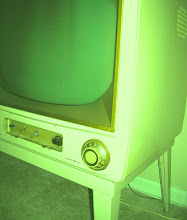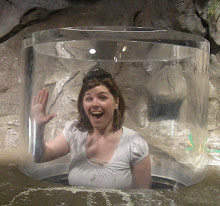After a long break, I am back, and I promise to start posting with a vengeance, so watch out! I've finished up some things and now have time and a television. Whee.
As the new fall TV season is just getting started in the U.S. I don't have too much to say on American television. Yet. But, I have a list of shows I want to give a chance, and a color coded schedule will be coming soon. But, I have been watching some stuff here in Great Britain--namely the Olympics. I know this post is a little outdated since the Michael Phelps Games (ahem, the 2008 Summer Olympics) finished about three weeks ago or so, but I hope you will indulge me for just one more Olympic post.
I did most of my watching via the internet, which I think is the wave of the future (or, I guess the wave of the present). There were several things that I liked, both about watching on-line and with the BBC broadcast. The obvious one being that it was great to be able to watch the Olympics without owning a television, because I had been worried about that, as I am AN OLYMPIC FREAK. The other nice thing about watching on the internets was that I had several different streams of sports available to me at any given time, and I could watch highlights (of say, the swimmer boys) over and over if I wanted to. Not that I did, of course.
Specifically to the BBC broadcast, first and foremost were the English, Scottish, and Irish accents. Seriously, that was fun. I also got to "meet" athletes that weren't American or have the required sob story needed to make it on American coverage. There was still plenty of "American" action, and Michael Phelps was covered in great detail.
The parts that I didn't enjoy so much included:
Losing the element of surprise. Events were shown live around 3 am in the morning and generally I woke up, opened my computer, and found the results are displayed all over my screen. I have to say, the events I managed to not know the outcome (such as the Men's 4x100 Medley Relay) were much more exciting than when I did know the results. (such as which American gymnast won the gold). I also missed not getting to see American athlete interviews: I admit it, I am a homer. I root for Americans (often, though not always) and I like to hear what the athletes have to say. Even if it is just so I can make fun of them.
The idea of showing events live is an interesting one, and I get that generally this is a good idea, but I'm not sure about it in practice. Beyond what I mentioned above, doing this meant that sometimes I only got to see highlights: if I didn't catch the event live or on rebroadcast, I didn't always get to see it, if the BBC decided not to upload the full coverage.
I do think, however, that this practice points to a more general difference in the BBC experience versus the NBC one. In the U.S., it is all about ratings, and we are fed one feature story after another, barely seeing athletes or events that aren't either American or high profile, and have lots of commercials, albeit cool ones. The Olympics are a "viewing event" so to speak, much like an extended Super Bowl. Here the Olympic coverage is much more practical and no-nonsense. Because it isn't all about ratings (as the BBC does not need commercials or ratings to survive) there isn't the sense that one needs to pull out all the stops. I saw literally, no features stories, and no commercials. I can't necessarily say that one is better than the other, as I think they both have their good and bad points. I suppose the perfect experience would be somewhere in the middle, with some features, and more events and athletes shown. Maybe in 2012 I will broadcast Sara TV with this combo of coverage.
There is just one other point I'd like to mention, mainly because I find the contrast interesting and discussion provoking. If anyone watched the diving events, and more specifically the Men's Platform Final, you know that Matthew Mitchum from Australia won. It was a very emotional victory and his final dive was beautiful. Throughout the competition, the British commentators mentioned that he had recently been through a rocky time, and that was mainly due to the fact that he had recently come out as a gay man. This was said in a very matter of fact tone, and as part of the general info on the diver, but it was pointed out doing this has been the cause of a lot of pressure on him. I remember wondering at the time if this fact was mentioned on the U.S. broadcast. I did some digging after the event and found out that this little fact was not mentioned, but other athletes' heterosexual relationships were mentioned. You can read about it
here if you like, from Yahoo Sports. I am not writing this to stir up things, but because I found the contrast interesting. I'm not entirely sure as to all the reasoning behind this, but I would wager that part of it is because NBC relies upon adverstisers and high ratings to survive.
Anyway, that was my Olympics. If anyone is reading this, let me know what you think, and what you thought of your Olympic viewing experience in whatever country you are in.
I'll be back soon with many thoughts on the new Fall TV season, one of my favorite times of the year!


